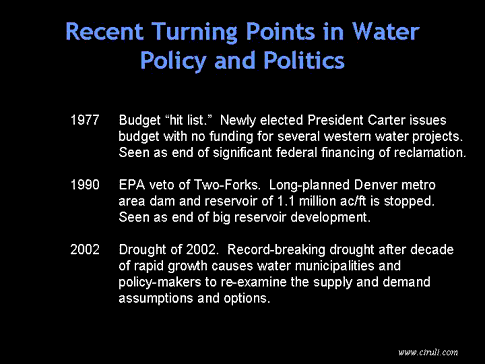|
New Political Environment of Water
Recent turning point in water policy and politics
Although water politics are usually conducted behind the scenes and slow to change, there were key events that put water on the front page and shifted policy dramatically. For example:
- n 1977, President Carter, reacting to change in environmental politics, project economics and a strained federal budget, cut funding for Western projects, signaling the end of major federal financing of Western reclamation.
- - The Environmental Protection Agency veto of the 1.1 millionacre foot Two Forks Dam in November 1990 was a major blow to Denver metro area water and civic leaders. Water managers shifted direction to managing limited supplies without additional large-scale storage.
- - The 2002 drought leads to the next major shift in water policy. A decade of rapid growth and the record-breaking drought has lead to a spike in water prices, water rationing and created major impacts on the economy. The tipping point was the 2002 special legislative session in early July. The spring and early summer fires and growing water shortage of 2002, especially for agriculture, forced the political and water establishments to take action. The key proposal, a $10 billion financial package, was debated and ultimately defeated. But finally, water supply was a top political topic for action and all the old assumptions and a host of new options were on the table.
|
